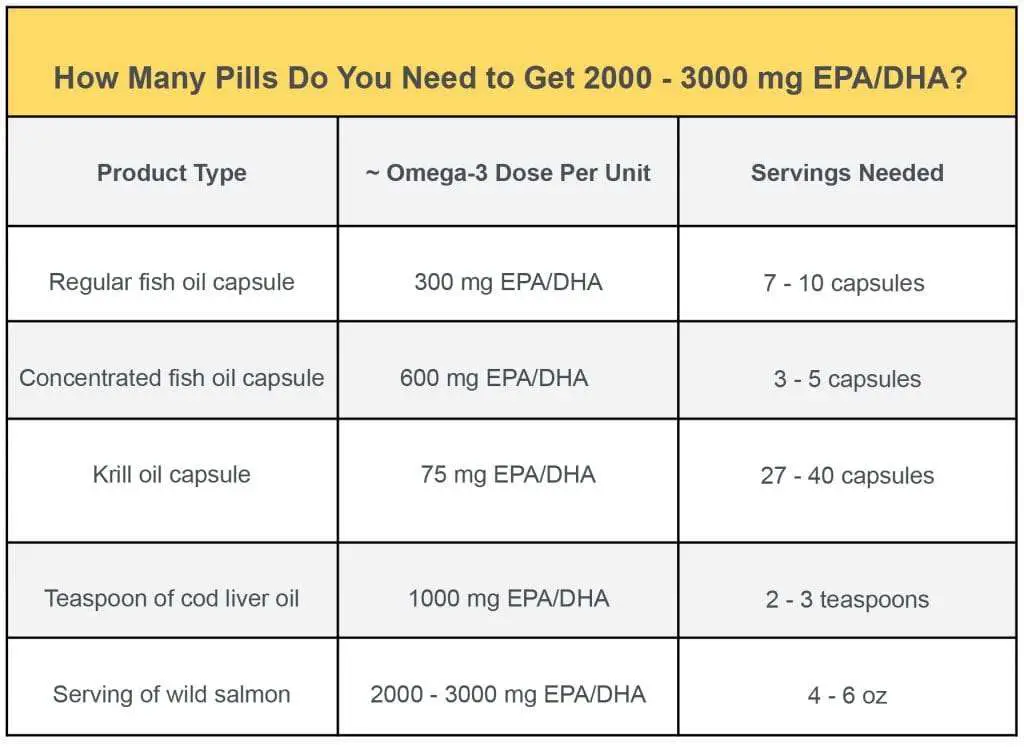How much fish oil to take?
The American Heart Association recommends up to 3 grams of fish oil daily for heart health. Consult your healthcare provider before exceeding this amount.
How much fish oil to take? Navigating the world of supplements can be perplexing, particularly with the abundance of health advice available. Fish oil, touted for its omega-3 fatty acids, plays a vital role in maintaining cardiovascular health and supporting other bodily functions. Striking the right balance in dosage is essential – it ensures you reap the benefits without encountering potential risks associated with overconsumption.
By adhering to guidelines provided by reputable organizations and getting personalized advice from healthcare professionals, individuals can safely incorporate fish oil into their wellness regimen. Understanding the importance of dosage, which varies based on individual health goals and conditions, allows consumers to make educated decisions about their supplementation practices.
Finding Your Balance: Determining The Optimal Fish Oil Dosage
Discover the ideal fish oil intake for your health needs with our guide on determining the right dosage. Tailor your fish oil consumption to benefit from its rich omega-3 content without overdoing it.
Navigating the sea of supplements can feel overwhelming, especially when determining the right fish oil dosage for your health regime. Balancing efficacy with safety is key to reaping the benefits of Omega-3 fatty acids without overdoing it.
Understanding Fish Oil Benefits And Dosage Recommendations
The starting point for anyone considering fish oil supplements should be to understand its benefits and the general guidelines for dosage. The American Heart Association suggests that adults consume two servings of fatty fish per week, whereas specific conditions may require a higher intake:
- Heart health: Studies suggest that 1 gram per day may support individuals with existing heart disease.
- General wellness: For those without a history of heart disease, a lower dose of 250-500 milligrams daily is often recommended.
Personal Health Factors And Fish Oil Dosage
Just as fish navigate through varying depths, finding the right fish oil dosage is about diving into your personal health needs. Consider the following factors:
- Current health status: If you’re managing a health condition, your recommended intake may differ from the general population.
- Life stage: Pregnant women and older adults, for example, have unique dietary needs that can influence optimal dosage.
- Diet: Your regular consumption of seafood can impact how much supplemental fish oil you need.
Interpreting Fish Oil Supplement Labels
Deciphering supplement labels is crucial for hitting your Omega-3 targets. Here’s what to look for:
- EPA and DHA levels: These are the active Omega-3 components in fish oil, and their concentration can vary.
- Serving size: Pay attention to the number of capsules per serving to accurately calculate your intake.
- Purity and sourcing: High-quality supplements reduce the risk of contaminants and ensure sustainable fishing practices.
Tailoring Dosage Based On Omega-3 Index Tests
Fine-tuning your fish oil intake can be guided by Omega-3 index tests. These blood tests measure your body’s Omega-3 levels, offering insights into whether you’re consuming an adequate amount:
- Low Omega-3 Index: Can suggest a need for increased fish oil supplementation.
- Optimal Omega-3 Index: Indicates that your current dietary and supplemental choices are on target.
Incorporating these principles can help you chart a healthier course. Remember, consulting with a healthcare professional before adjusting your supplement routine can ensure that you find the balance that’s right for your body’s navigational chart.

Navigating Dosage Decisions: How Much Fish Oil Should You Really Take?
Determining the optimal fish oil intake hinges on individual health goals and medical advice. Explore the factors influencing your ideal dosage to maximize omega-3 benefits.
Navigating the world of supplements can often feel like charting your way through unfamiliar waters. Determining the right fish oil dosage for your individual needs is no exception. Let’s dive in.
Understanding The Basics: What Is Fish Oil?
Fish oil is rich in omega-3 fatty acids, critical components for maintaining heart health, supporting brain function, and reducing inflammation in your body. But not all fish oil is created equal, and dosage recommendations can vary.
Customizing Your Dosage: Factors To Consider
Deciding on the right amount of fish oil involves considering several key factors:
- Body weight: Heavier individuals may benefit from a higher dosage.
- Health goals: Higher doses may be recommended for specific health conditions.
- Dietary intake: Those who consume less omega-3 rich foods might need more fish oil.
- Fish oil concentration: Supplements vary in their EPA and DHA levels, the active omega-3 compounds.

Recommended Daily Intake: General Guidelines
Experts suggest a baseline from which personal adjustments can be made:
- Daily maintenance: Aim for a starting point of 250-500 mg of combined EPA and DHA.
- Specific health conditions: Some research advises higher doses; consult a healthcare provider for tailored advice.
Beyond The Label: Quality And Purity Matter
Not every fish oil supplement is created equal. Pay attention to these key aspects:
- Purity: Certifications can indicate a product has been tested for contaminants.
- Freshness: Rancid fish oil is ineffective and potentially harmful.
- Sustainability: Ethically sourced fish oil ensures environmental responsibility.
Talk To A Professional: When In Doubt
For the safest and most effective use of fish oil, remember:
- Professional guidance is invaluable: Your doctor can provide personalized recommendations.
- Sharing your full health picture: Inform your healthcare provider of all the medications and supplements you take.
Tailoring Your Supplement Routine: Calculating The Right Fish Oil Intake
Determining the ideal fish oil dosage hinges on factors like age, health, and lifestyle. Tailor your supplement routine with a precise fish oil intake for optimal health benefits.
When delving into the benefits of fish oil, it’s essential to understand that not one-size-fits-all. Discovering the ideal dosage for your body can enhance the effectiveness of this omega-3 rich supplement. Here’s what you should consider to tailor your fish oil intake precisely to your needs.
Assessing Your Dietary Intake
Before adding a fish oil supplement to your routine, take a moment to evaluate your current diet. By understanding the amount of omega-3s you already consume, you can adjust your supplement dosage accordingly.
- Dietary habits: If you frequently eat fatty fish, such as salmon or mackerel, you may require less supplemental fish oil.
- Omega-3 content in meals: Some foods, like walnuts and flax seeds, are rich in omega-3s. Include these in your assessment to avoid over-supplementing.
Considering Health Goals
Your personal health objectives play a crucial role in deciding the amount of fish oil you should take. Are you aiming for general wellness, or do you have specific targets like improving heart health or reducing inflammation?
- Preventive care: A lower dose may suffice if you are looking for general health maintenance.
- Therapeutic use: Conditions such as high triglyceride levels might necessitate a higher dose, under a healthcare provider’s guidance.
Engaging with a healthcare professional is always recommended, especially if you’re considering higher doses of fish oil. This tailored approach ensures a balance that aligns with your health needs and dietary intake, setting the stage for optimal well-being.

Frequently Asked Questions For How Much Fish Oil To Take
What Is The Recommended Fish Oil Dosage?
The recommended daily dosage of fish oil can vary depending on individual health needs, but generally, 250-500 mg of combined EPA and DHA is advised for adults. Consult with a healthcare provider for personalized recommendations.
Can You Take Too Much Fish Oil?
Yes, taking more than 3 grams of fish oil daily can lead to excessive bleeding, reduced immune function, and other side effects. It is essential to adhere to recommended dosages or seek medical advice before exceeding them.
How Does Fish Oil Benefit Your Health?
Fish oil is rich in omega-3 fatty acids, which support heart health, reduce inflammation, and can improve mental health. Consistent supplementation has been linked to numerous health benefits.
Does Fish Oil Have Any Side Effects?
Like any supplement, fish oil can have side effects which include fishy burps, gastrointestinal issues, or allergic reactions. Taking high-quality fish oil with food may help mitigate some of these effects.
Conclusion
Determining the right fish oil dosage hinges on personal health goals and physician advice. Aim for a balance, monitoring your body’s response. Remember, quality supplements yield the best results. Consult a healthcare provider to tailor the perfect dose for you.
Your path to optimal health awaits with just the right amount of fish oil.









